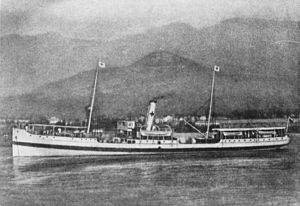Russian hospital ship Vpered
 Vpered during her service as a hospital ship in World War I.
| |
| History | |
|---|---|
| Name |
|
| Owner | Azov Black Sea Steamship Co. |
| Port of registry | |
| Ordered | 1898 |
| Builder | Stabilimento Tecnico |
| Laid down | 1898 |
| Launched | 1898 |
| Completed | 1898 |
| Maiden voyage | 1898 |
| In service | 1898 |
| Fate | Torpedoed and sunk 8 July 1916 |
| General characteristics | |
| Type | Passenger ship/Hospital ship |
| Tonnage | 859 GRT |
HS Vpered (Russian: госпитальное судно "Вперёд") was a Russian hospital ship that was torpedoed by the Imperial German Navy submarine SM U-38 on 8 July 1916.[1]
Construction
[edit]SS Vpered was built at the Stabilimento Tecnico shipyard in Trieste, Italy, in 1898 for Azov Black Sea Steamship Company. She was launched and completed in the same year. The ship was assessed at 859 GRT.[1]
World War I and sinking
[edit]Vpered was converted into a hospital ship when World War I broke out and operated in the Black Sea to evacuate wounded Russian soldiers from the Eastern Front.[1]
On 8 July 1916, Vpered was torpedoed by the Imperial German Navy submarine SM U-38 in the Black Sea between Rize and Batum. She sank shortly after. She was not carrying any wounded soldiers at the time, but seven people died in her sinking. Her survivors were saved a short time later.[2]
The Russian Empire claimed that Ottoman forces sank Vpered rather than the Germans.[3] The Ottoman Empire replied that both the Vpered and the Russian Hospital Ship SS Portugal ( which was torpedoed and sunk on March 17, 1916 ) were sunk by mines.
See also
[edit]References
[edit]- ^ a b c "SS Vperiod (Вперед) (+1916)". wrecksite.eu. 3 October 2010. Retrieved 14 July 2016.
- ^ П.Г.Усенко (P.G.Usenko), IСТОРIЇ ВЕЛИКОЇ ВIЙНИ 1914–1917 рр. НА ЧОРНОМУ МОРI[permanent dead link] (From the history of the Great War of the 1914-1917 on the Black Sea). Page 80. (in Ukrainian)
- ^ "Peace Movement Diverts Attention at Year's End from Battlefields to Chancelleries of Belligerents and Principal Neutral Capitals" (PDF). The New York Times. December 31, 1916. Retrieved August 24, 2009.
- 1898 ships
- Passenger ships of Russia
- Hospital ships in World War I
- Steamships of Russia
- Ships built in Trieste
- Maritime incidents in 1916
- World War I shipwrecks in the Black Sea
- World War I ships of Russia
- Hospital ships of the Soviet Union and Russia
- World War I crimes by Imperial Germany
- Attacks on hospitals during World War I
